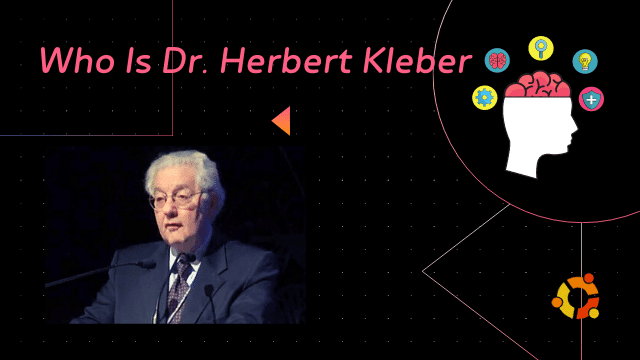Why Dr. Herbert Kleber Is The Only Skill That You Really Need
Addiction Treatment by Dr. Herbert Kleber
Dr. Herbert Kleber is best known as a popular author and practicing psychotherapist.
He is also recognized as the foremost authority on anti-anxiety medication.
In addition, he is also credited with being the first to apply behavior therapy in the field of psychiatric practice.
Because of this, Dr. Kleber has become one of the most prolific authors in the field of psychiatry.
A former Harvard medical student, he received his doctorate in psychiatry at the College of Medicine.
Kleber is considered one of the fathers of modern addiction therapy and continues to work today as a consultant and therapist.
His research focuses on understanding the brain’s physiological mechanisms involved in addictive behavior and is a key source of much current treatment.
His work has profoundly affected the way addiction is treated today.
A Unique Approach to Treating Addiction
Herbert Kleber served time in prison for his drug addiction.
Though he was allowed to continue his practice in Boston, he felt a need to find work where he could be surrounded by normal people.
He decided to start treatment at the New York State Psychiatric Institute (NYSPI) in Bronx, New York.
From this point, he expanded his practice to include rehabilitation, group homes, outpatient clinics, hospitals, and facilities for drug treatment.
During this time, he worked with such renowned doctors as Dr. Amen, Dr. Elson M. Piper, Dr. Lawrence B. Krystal, and Dr. Andrew R. Clements.
While working as a psychiatrist at the New York State Psychiatric Institute, located in New York City, he developed a concept called “habituation disorder.”
According to his theory, people who suffer from habituation can be cured through a combination of counseling and anti-anxiety medications.
Herbert Kleber used these two approaches to develop what would become the habituation cure, which ultimately led to the creation of the pill. As a result, he was able to introduce the habituation cure to the health care system and helped thousands of addicts recover from their addictions.
Although not particularly focused on addiction or the development of addictions, Dr. Kleber does bring great value to the field of psychology by providing a perspective that is critical to the mental health of all addicts. As an example, he demonstrates that the way society views obesity will lead to more overweight individuals and that societal views will inevitably lead to more adult pornography.
He offers the opinion that these factors are so interconnected because they all contribute to an inter-relationship that is not easily separable. He provides a valuable perspective on how an individual’s coping mechanisms for distress will influence his/her ability to fight addictions.
As a psychotherapist and addiction specialist, Dr. Kleber has seen the effects of the disease in real-time and written about it in his well-received book, Managers of Addiction: Traumatic Stress and the Psychology of Abusive Treatment. As a deputy director for demand at the. California State University at Northridge, Dr. Kleber developed the concept of the “principally responsive” patient. These are people who have substance abuse problems but have internalized the behaviour so much that they respond to it. This is a very different approach than therapists who look to the cause (material, biological, social) of distress. For them, treating the person only helps them manage the distress they experience, but does not address the root of the problem – they are just like any other person who may react to distress in a variety of ways.
As a clinical psychiatrist, Dr. Kleber advocates an evidence-based practice called “holistic diagnosis.” This is the use of past evidence to diagnose and treat patients. According to him, a moral failing, for instance, is a medical problem that can be treated both physiologically and psychologically. In this case, the patient’s substance abuse was addressed by adding counselling, which led to significant changes in her life, and a new career as a physical therapist.
Although there are many areas of medicine where he’s had a significant influence, Kleber is best known for his work in substance abuse and addiction. He continued his education after his release from prison and went on to become a practising psychiatrist in private practice. While working in a prison hospital, he developed a methodology called “holistic” psychiatric care that continues to this day in many clinics throughout the United States.
After serving time in prison, Kleber formed the nonprofit International Drug Dependence Foundation (IDDF) and called it “The Last Paradise.” It is housed in a beautiful old historic home in Lexington, Kentucky. The IDDF was designed to provide a one-on-one addiction treatment program for anyone who suffers from addiction. Patients are assigned their own nutritionist, psychiatrist, psychologist, social worker, and licensed nurse to work closely with them. The staff is made up of licensed Kentucky health care professionals, medical staff from the Lexington prison hospital.
When patients are first admitted into the Lexington facility, they are not familiar with the staff or with the programs that are offered. Because of this, some of them feel apprehensive and uncomfortable. However, once Dr. Kleber begins his treatments, they realize that Dr. Kleber is a warm, loving, and knowledgeable doctor who cares about their well being. He treats the patients with kindness and compassion and helps them to become productive members of society.
Another of Dr. Herbert Kleber’s specialties is treating addiction with detoxification. In detoxification, patients are subjected to a regimen of intravenous medication, generally methadone, in an attempt to rid their bodies of any remaining heroin, opiate, or alcoholic substances. According to law, in treating addiction, “no one is cured…but everyone can be cured.” According to him, once a patient has been stabilized, “he can begin working on himself to overcome his cravings and regain control of his life.”
Although there are many addiction treatment centres in the country today, there are none that specialize in substance use disorders, such as heroin or prescription medications. As a result, the medical community has developed additional methods of treating patients for a variety of other illnesses, including alcoholism, depression, bipolar disorder, and schizophrenia. Although many of these programs have excellent success rates, none of them offers a treatment approach that fully understands the nature of addiction and can provide permanent recovery. This is what makes Dr. Herbert Kleber’s approach so unique – his focus on individual need, rather than on a treatment system designed for every patient.














